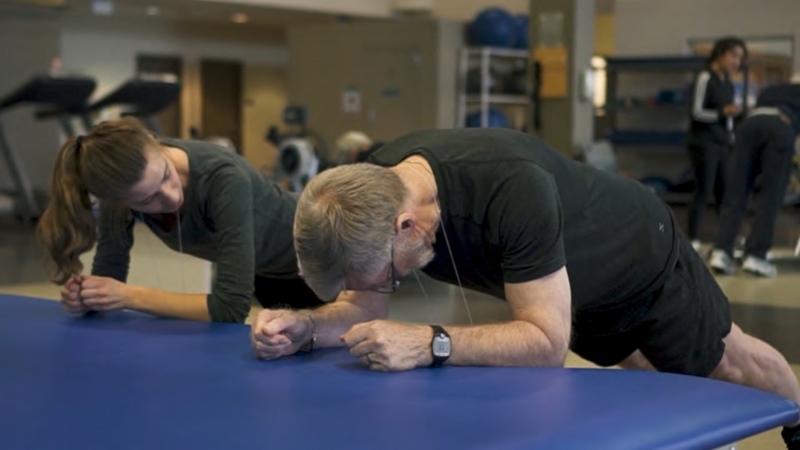New tools and resources available for persons living with dementia
UNBC researchers Dr. Shannon Freeman and Dr. Chelsea Pelletier are co-leading the northern B.C. component of the Dementia-Inclusive Choices for Exercise project.

Many things change when a person is diagnosed with dementia, but one thing that doesn’t have to is the ability to exercise.
Dementia-Inclusive Choices for Exercise (DICE) is a cross-Canada research team that has developed a new series of tools and resources to help exercise providers create inclusive programs and spaces for people living with dementia and support their knowledge and confidence to continue or begin exercising.
Led by the University of Waterloo, the team is made up of 29 people from 10 organizations, including University of Northern British Columbia researchers Dr. Shannon Freeman and Dr. Chelsea Pelletier. The team also includes, other researchers, persons with dementia, care partners and 10 community organizations from Nova Scotia to northern B.C.
“Exercise has important benefits to physical, mental and social well-being for people living with dementia,” says Laura Middleton, a Kinesiology and Health Sciences Professor at the University of Waterloo who leads the group. “People living with dementia who take up exercise have improved functional abilities day to day. This may be the result of several direct benefits, including improved aerobic fitness, better balance and mobility, increased strength and, less conclusively, increased cognitive function.”
Freeman, an Associate Professor in the School of Nursing and Pelletier, an Associate Professor in the School of Health Sciences, are co-leading the northern B.C. team.
“Through the DICE project, we gathered input and feedback from persons across northern BC to ensure that the resources developed support inclusion of persons living with dementia in northern, rural, and remote communities,” Freeman says. “Ensuring physical activity program is accessible and inclusive is key to better support and empower individuals living with dementia and their caregivers as they develop physical fitness routines.”
Middleton says there are also important social benefits to exercise, especially when it is done with others. “People living with dementia receive encouragement and social support from their instructor and peers. They feel a sense of community and inclusion. As a result of improvements during exercise, they can also feel more confident in all aspects of life. For those who have been active earlier in their life, exercise can help maintain their sense of identity despite dementia.”
Middleton assembled the DICE research team after collaborating with the Alzheimer Society’s Minds in Motion program. She realized that no one program is sufficient to meet the preferences and needs of a diversity of people living with dementia.
“Our goal for the Dementia-Inclusive Choices for Exercise project is to make more community and clinical exercise programs accessible and inclusive," Middleton says. "That way, people living with dementia can choose a program that is close to them and aligned with their needs, goals and preferences for exercise programming.”
DICE provides training modules that educate and train exercise providers to understand and meet the physical activity needs of people living with dementia. This includes education about the rights of people living with dementia to inclusion in exercise and physical activity programs, the benefits of physical activity, physical activity recommendations, approaches to communication, exercise program delivery and planning, as well as facility design and the diversity of dementia (such as age of onset, abilities and challenges).
“The most profound change for exercise providers is the realization that their actions affect the ability of people living with dementia to participate,” Middleton says. “People often think that participation is only based on the abilities of the person living with dementia. This isn’t true!”
She says small things – from altering the environment (by reducing noise, using clear signage and removing mats or carpets, for example), to tweaking exercise delivery through simple, clear communication or altering how providers demonstrate, give feedback or pay attention to their clients – can enable people living with dementia to participate in their communities.
“In the end, people living with dementia have a right to benefit from health care and rehabilitation through exercise and to participate in sports, recreational and other leisure activities in their communities. This is a right supported by the United Nations Convention on the Rights of Persons with Disability.”
To access the training modules and videos, please see Dementia-Inclusive Choices for Exercise.
